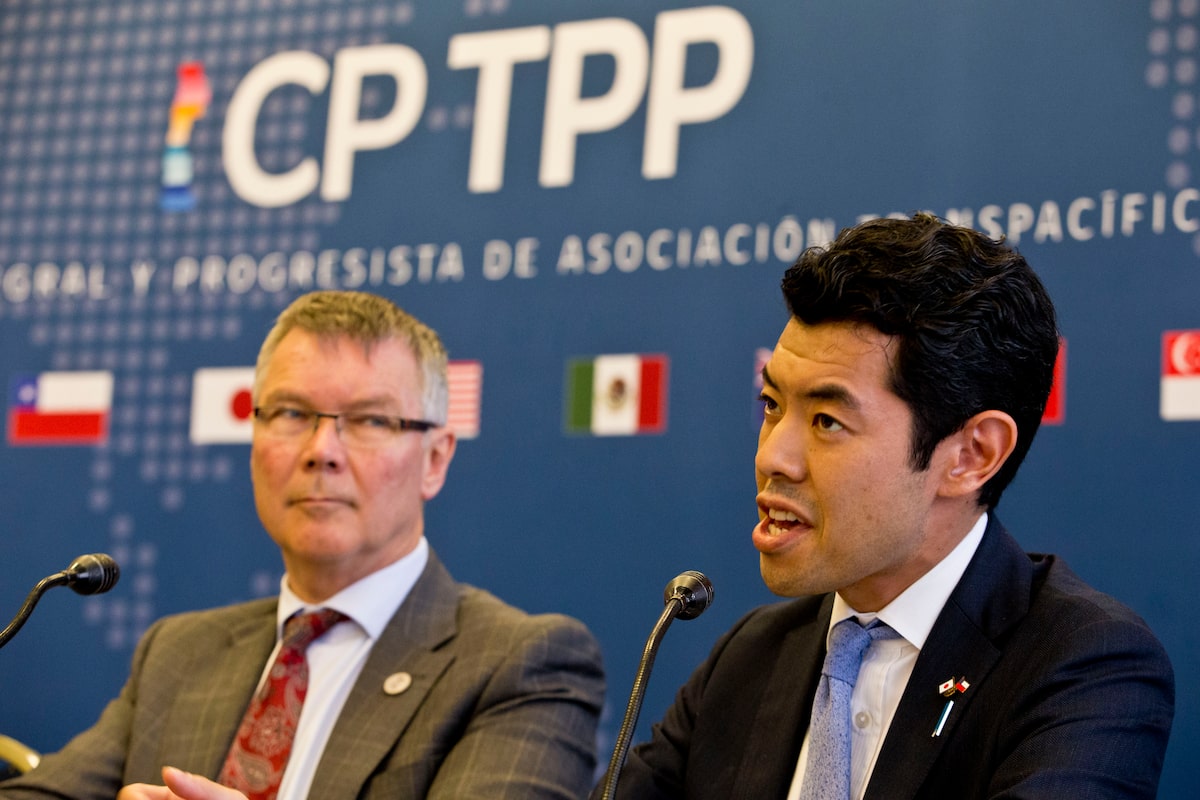Kiyoto Tsuji, Parliamentary Vice-Minister of Foreign Affairs of Japan, talks next to David Parker, Minister for Trade and Export Growth of New Zealand during a meeting of the Comprehensive and Progressive Agreement for Trans-Pacific Partnership, CP TPP, in Santiago, Chile, on May 16, 2019.Esteban Felix/The Associated Press
Douglas Alexander is the United Kingdom’s Minister for Trade Policy and Economic Security.
I suspect most British people would consider Canada an Atlantic country. Not only do millions of us have relatives “on the other side of the pond,” but we’ve been raised on stories of the navigation of the St. Lawrence Seaway and the heroism of Canadian forces at Juno Beach on D-Day.
Given my own family’s history, I’ve always perceived Canada at least as much as a Pacific power.
My grandparents were medical missionaries in China who, at the outbreak of the Second World War, were evacuated with children in tow across the Pacific. My mother attended high school in West Vancouver before pursuing medical studies in the West of Scotland. And 40 years ago this year, I continued that tradition, leaving Scotland as a young man to study for two years on Vancouver Island at the Lester B. Pearson College of the Pacific.
Canada’s position as a Pacific power is important. Today, the Pacific region has arguably never mattered more to the future of the global economy.
It is against this backdrop that the United Kingdom has joined the Comprehensive and Progressive Agreement for Trans-Pacific Partnership. Last week’s CPTPP Commission meeting in Vancouver was a milestone, as it was the first time the new U.K. government participated in a meeting and was involved in negotiations with the Indo-Pacific partners. As of Dec. 15, the members who have ratified will formally begin trading with the U.K. under the agreement.
CPTPP members’ economies already accounted for £121.4-billion worth of U.K. trade in 2023. We know the U.K.’s accession to the agreement can potentially boost our GDP by around £2-billion each and every year when compared to projected GDP in 2040.
The CPTPP was signed in 2018 between Australia, Brunei, Canada, Chile, Japan, Malaysia, Mexico, New Zealand, Peru, Singapore and Vietnam. After the U.K. joins the Pacific trade pact, CPTPP’s combined GDP will stand at roughly $21-trillion. That’s 15 per cent of all global GDP, with businesses from all member countries standing to benefit from the diversified supply chains and increased market access our accession brings.
Our enthusiasm to join has been shared by successive governments who, like Canada, understand the strategic and economic importance of the Indo-Pacific region in the years to come. We are the first European country to join the group, which is not just a bulwark of free trade in the Pacific region, aligning members on shared principles of open markets, intellectual property protections and labour standards; it’s also at the forefront of shaping global trade rules.
Economic power has been – for quite some time – shifting to the Indo-Pacific, with India in its west, China near its centre, and the U.S. and the Pacific Rim on its east. The region will account for the majority of global growth and around half of the world’s middle-class consumers in the decades to come.
By 2050, China and India are projected to be the world’s largest and third-largest economies, respectively, and would comprise one-third of the world economy. Meanwhile, the Philippines and Vietnam are expected to become the world’s 19th- and 20th-largest economies, respectively.
Canada, the U.K. and other Western countries need to adapt accordingly to these economic realities and the headwinds the future of free trade faces. As proudly internationalist, free-trade championing nations who also recognize the dangers of overreliance in a volatile global economy, we are navigating a highly complex geopolitical climate together.
We must acknowledge that what happens in the Indo-Pacific over the next three years will help determine the trajectory of our economies for the next 30 years and beyond. Transpacific alliances – our partnerships with Japan, South Korea, Thailand and others – will be key to the future security of the Indo-Pacific and to our future prosperity, too.
